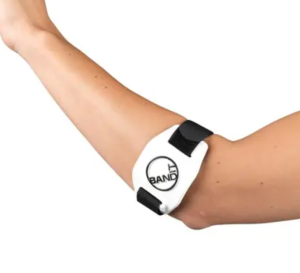Tennis elbow, also known as lateral epicondylitis/epicondylalgia, is swelling and pain of the tendons that bend your wrist backwards away from your palm. Usually, it is diagnosed in both men and women between the ages of 30 and 50 years.
What is tennis elbow?
Firstly, tennis elbow is inflammation or, in some cases, micro tearing of the tendons that join the forearm muscles on the outside of the elbow. As a result, the forearm muscles and tendons become damaged from overuse— repeating the same motions again and again. Ultimately, this leads to pain and tenderness on the outside of the elbow.
What are the causes of tennis elbow?
1. Overuse
Recently, studies show that tennis elbow is often due to damage to a specific forearm muscle. The ECRB (extensor carpi radialis brevis) muscle helps stabilize the wrist when the elbow is straight. The ECRB may also be at increased risk for damage because of its position. As the elbow bends and straightens, the muscle rubs against bony bumps. Consequently, this can cause gradual wear and tear of the muscle over time.
2. Activities
Contrary to what people expect, athletes are not the only people who get this condition. In fact, most people with it are those who participate in work or recreational activities that require repetitive use of the forearm muscles, wrist, and hand. For example, painters, plumbers, and carpenters are particularly prone to developing tennis elbow. Studies have shown that auto workers, cooks, and even butchers get it more often than the rest of the population. Overall, it is thought that the repetition and weightlifting required in these occupations leads to injury. Playing tennis is a possible cause but other activities can also put you at risk.
3. Age
Most people who get tennis elbow are between the ages of 30 and 50, although anyone can get this condition if they have the risk factors. In racquet sports like tennis, improper stroke technique and improper equipment may be risk factors.
4. Unknown
Unfortunately, tennis elbow can occur without any recognized repetitive injury. This occurrence is called idiopathic, or of an unknown cause.
What are they symptoms of tennis elbow?
Typically, the symptoms develop gradually. In most cases, the pain begins as mild and slowly worsens over weeks and months. There is usually no specific injury associated with the start of symptoms.
Common signs and symptoms include:
- Pain on the outer part of your elbow, especially to touch
- Weak and/or painful grip strength
- Sometimes, pain at night
What is the treatment for tennis elbow?
Nonsurgical Treatment
There are many treatment options for this injury. In most cases, treatment involves a team approach. Primary doctors, physical therapists and, in some cases, surgeons work together to provide the most effective care. Approximately 80 to 95% of patients have success with nonsurgical treatment.
1. Rest – The first step toward recovery is to give your arm proper rest.
2. Medications – Secondly, acetaminophen or nonsteroidal anti-inflammatory drugs (NSAIDs), such as ibuprofen or naproxen, may be taken to help reduce pain and swelling.
3. Physical therapy – Specific exercises are helpful for strengthening the muscles of the forearm. Your physiotherapist may also perform ultrasound, ice massage, or muscle-stimulating techniques to
improve healing.
4. Brace – Using a brace centered over the back of your forearm may also help relieve symptoms of tennis elbow. This can reduce symptoms by resting the muscles and tendons.
5. Steroid injections – In some cases, steroids, such as cortisone, may be indicated to help with inflammation. Your doctor may decide to inject the painful area around your lateral epicondyle with a steroid to relieve your symptoms.
If you are experiencing elbow pain or think you may have tennis elbow, come for an assessment at PhysioNow. Our physiotherapists will do thorough evaluation of all your symptoms and problem areas. Then, they will formulate and discuss an individualized treatment plan for you. Thus, if you are having above symptoms or know anyone who needs help with the same, book with us at PhysioNow!



